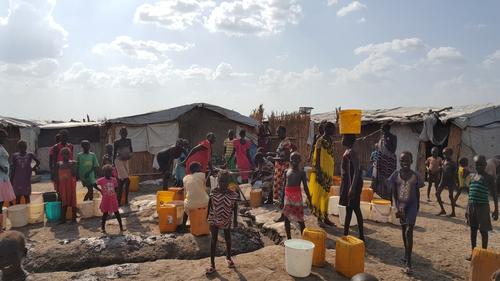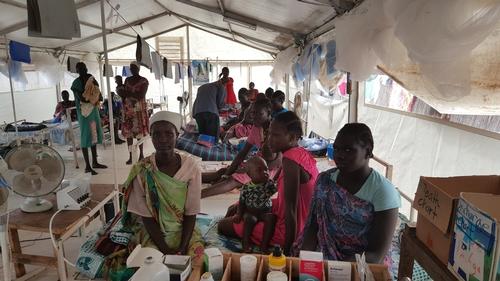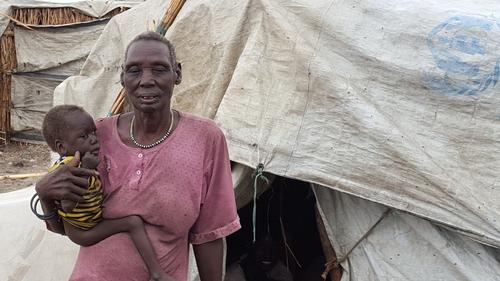Nyanjima – the future doctor
A muddy track branching off the main road connecting Agok town to Abyei leads to Wodchay village. Among the pathways of the village lies the home of Nyanjima Mayot. She is a calm, soft-spoken 12-year-old girl with a broad smile. Her smile beams as she welcomes a team of medical personnel from the Médecins Sans Frontières (MSF) hospital in Agok. The team of two, a training nurse and a nurse assistant, travelled more than ten kilometres to monitor their patient’s health.
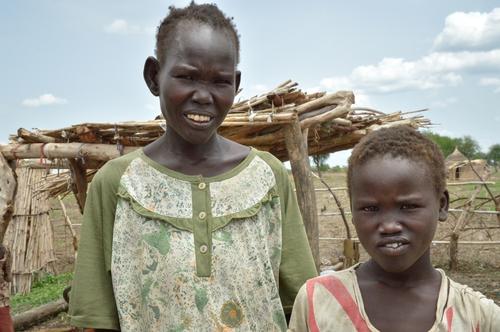
Nyanjima, the fifth child in a family of eight, is suffering from diabetes. One morning in 2013, Nyanjima collapsed while attending her classes at Ganga primary school in Abo-tok. She was quickly rushed to a nearby health facility, where she was given first aid and regained consciousness. Two days later, Nyanjima fainted again and her parents were advised to take her to the MSF hospital in Agok.
“Nyanjima was diagnosed with insulin-dependent diabetes mellitus, and we quickly put her on medication,”says MSF training nurse, Saviour Dombojena.
Splitting the family
Type 1 diabetes requires daily injections of insulin, but the distance from Nyanjima’s home to the hospital meant that she could not come every day for medication. Her mother had no choice but to leave her siblings at home with their father so she could take care of Nyanjima in Agok as she underwent her treatment. Nyanjima’s mother was the breadwinner of the family, and this task was now transferred to her father. But he struggled to take care of the family alone, and Nyanjima’s mother had to return home, leaving Nyanjima at a relative’s home in Agok town.
Nyanjima was not happy in her new circumstances. She spent a large part of each day at the hospital and had to drop out of school. She was missing her family and was increasingly miserable.
Reunification through home care
Nyanjima is one of many diabetes patients facing these difficulties. In order to make life easier for patients, the MSF team in Agok has introduced a home insulin programme.
“People came for treatment from villages and towns several days of travel away,” says Dombojena. “Families were separated; others were forced to find extra accommodation in Agok. With the hard economic situation, it was just not sustainable for many of them.”
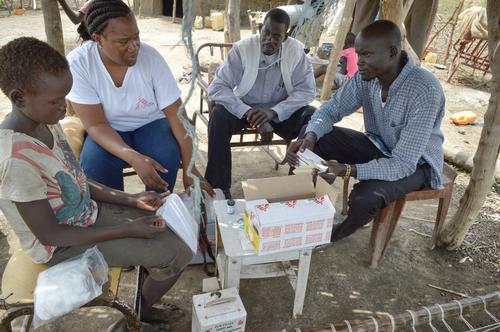
The home insulin programme started in July 2015 after a study showed that some insulin can be kept safely without refrigeration for a certain period of time. This made a significant change in South Sudan, where temperatures can reach well above the mid-40s Celsius and keeping drugs at safe temperatures is a huge challenge as electricity is not available in many areas.
MSF decided to train patients and their caretakers on how to administer insulin so that they would no longer have to come to the hospital every day.
“We trained them how to use a glucometer (the medical device used to determine the approximate concentration of glucose in the blood), how to control their diet and how to inject themselves,” Dombojena explains. “Under medical supervision, they were then asked to demonstrate their theoretical and practical understanding of how to administer the insulin before they went home.”
MSF provides free insulin, care and training. The diabetes patients come to the hospital once a month to pick up their insulin and undergo medical check-ups. They are also advised to come to the hospital if they feel any unusual symptoms.
Nineteen patients are now enrolled in the home treatment programme. This approach allows the patients to go about their normal activities, saves transport costs, and addresses the challenge of separating families.
For Nyanjima, this means that she could go back home to her family as she no longer had to go to the hospital for treatment every day. She is now able to safely administer the insulin by herself with her mother’s supervision.
Today Nyanjima is happy, living with her siblings and parents. She is back in school and she hopes to pursue her dream of becoming a medical doctor. “Many people in my village are suffering because of diseases,” says Nyanjima. “And I want to treat them,” she adds with enthusiasm.
The MSF Hospital in Agok is the only secondary health care facility in Abyei Administrative Area, serving a population of about 150,000 people. MSF has been working in South Sudan since 1983. MSF is currently running 17 regular medical projects throughout the country and in 2015 undertook close to a million medical consultations.



